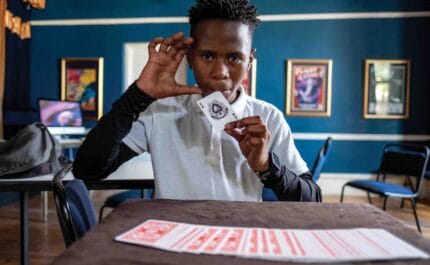Moment that mattered: The UK approves the Pfizer/BioNTech vaccine
We spoke to American scientist and vaccine researcher Dr Peter Hotez about hope, disinformation and the need for vaccine diplomacy

Staff at University Hospital, Coventry, applaud 90-year-old Margaret Keenan as she returns to her ward after becoming the first person to receive the Pfizer/BioNTech Covid-19 vaccine on 8th December 2020
2nd December 2020 (Taken from: #41)
On 2nd December, the UK became the first western nation to approve a Covid-19 vaccine for use. It was a welcome piece of positive news during a grim winter, and Dr Peter Hotez noted it with satisfaction. “Of course I was glad to see the first steps towards vaccinating the planet,” he says. “When you have a highly contagious infectious disease like Covid-19, that’s the best hope for [combatting] it.”
Hotez is one of the top vaccine experts in the US and has become a familiar face on the country’s news channels since the start of the pandemic. He and his team at the National School of Tropical Medicine at Baylor College, Texas, are working on their own vaccine against Covid-19. But he warns that the licensing of the Pfizer/BioNTech jab and the flurry of approvals for other highly effective vaccines that have followed aren’t enough on their own. In order to defeat the disease at a global level and to tackle future pandemics, he says, we need “a two-pronged approach: building capacity and taking down the anti-science empire”.
“We need to build up self-sufficiency in vaccine development across the world,” says Hotez. “You’ve currently got a very unequal situation where we’re still overly dependent on multinational companies producing vaccines for North America and Europe, and hoping that some of the crumbs fall down to low- and middle-income countries… Very few doses have been given in Africa, very few in Latin America and very few in the poorest countries in Asia.” Africa is of particular concern. “The South African variant is now accelerating into Mozambique and Malawi, and if it really races through Africa they’re going to be in for a terrible time with Covid-19,” says Hotez. According to Unicef, by February almost 130 countries, with 2.5 billion people in total, were yet to administer a single dose.

Hotez (pictured above) says that India proves that low- and middle-income nations can produce quality vaccines at scale: the country’s Bharat Biotech is aiming to produce 700 million doses this year of its Covaxin jab, which has a reported efficacy rate of 81 percent. This suggests it’s possible that vaccines for Covid-19 – and for other pandemics in the future – could be produced locally where they are needed at a lower cost.
“Replicating India’s success in other countries requires international funds,” says Hotez. “But people don’t understand that for vaccines it’s not just a matter of building a factory. That would be a white elephant. It’s the human capital that you also need to build up.”
Funding the training of homegrown experts in poorer countries who can develop and produce vaccines locally isn’t only good for those countries – it should also reduce the likelihood of the virus mutating there, spreading globally and posing a challenge to the efficacy of existing vaccines. But the responsibility of funding this expanded reach, says Hotez, needs to fall on a larger group. “Part of the problem is we always go to the same three actors – the US, the UK and the nation known as the Bill & Melinda Gates Foundation, and we need greater participation… All the G20 countries need to create this new ecosystem for developing vaccines on every continent.”
At the moment, however, such co-ordination is being undermined by what Hotez calls ‘vaccine nationalism’. He points to Russia and China, which seem to be using their vaccines as political tools to gain leverage in international politics. “They are making one-off bilateral arrangements with countries to exert influence,” Hotez says. “It reminds me of what we saw during the Cold War and it’s destructive.”
Hotez is also extremely concerned – and visibly angry – over what he regards as coordinated efforts to undermine public confidence in vaccines. He says that ‘anti-science’ used to be a fringe concern but is now a “full-on globalised movement”. Hotez points the finger of blame at “some very dark forces, political extremist groups, QAnon, and now of course you have the Putin-led Russian government with a systematic programme of weaponised health communication. That’s causing an enormous amount of damage.” Researchers have linked Kremlin-backed media outlets to news stories in multiple languages casting doubt on western vaccines and promoting the Russian Sputnik V.
We have to battle anti-science with the same resolve with which we’re fighting global terrorism”
In his home state of Texas, Hotez says, anti-vaccine advocacy groups have ensured that over 100,000 children have not been given the vaccines [for diseases such as polio and tetanus] they’re supposed to have for school entry. “It’s happening under the banner of medical freedom on the right,” he explains. “The reason we lost half a million lives to Covid in the US is not only because of the virus; it was because millions of Americans are tying their political allegiances to defying vaccines, masks and social distancing. It’s a self-inflicted wound.” Countering such views is a major challenge. “I think we have to battle anti-science with the same resolve with which we’re fighting global terrorism and attacking climate change,” says Hotez. “Far more people have died from anti-science than global terrorism or even climate change at this point. It’s on that level of gravity.”
So far 2021 has brought some good news in the fight against Covid-19. Hotez says that the Biden White House has put the brakes on the anti-science rhetoric of the previous administration, and in late February the Covax vaccine-sharing scheme, led by the WHO and Gavi, a vaccine alliance set up by the Bill & Melinda Gates Foundation, made its first delivery to Africa, shipping 600,000 doses of the AstraZeneca vaccine to Ghana. That vaccine, developed in partnership with Oxford University, will be made available to developing countries at cost price.
The Covax shipment to Ghana is, however, a drop in the ocean. “The population of sub-Saharan Africa is more than a billion people,” says Hotez. “If we think we need to vaccinate 80 percent or more in order to stop virus transmission, we’re talking about 800 million people that need to be immunised. Most of the vaccines are two doses. That’s 1.6 billion doses, so the task is really daunting. We need the African continent to be able to produce its own vaccines in several sites.”
The vaccine Hotez and his team are working on went into clinical trials in India in November 2020. It uses the same technology as the recombinant hepatitis B jab that’s been deployed globally for the last 40 years, and which many low- and middle-income nations already have the capacity to make. Hotez describes his new jab as “a high-quality, old-school, durable vaccine that you could hit over the head with a hammer and it would still stay stable”. He hopes that at just $1.50 a dose (the Pfizer/BioNTech jab reportedly costs $19.50 per dose in the US) it could be a ‘People’s Vaccine’, produced locally in massive quantities across the world. Ultimately, he says, battling Covid-19 is a numbers game: “If enough people get vaccinated, I think we can make it.”
Slow Journalism in your inbox, plus infographics, offers and more: sign up for the free DG newsletter. Sign me up
Thanks for signing up.








